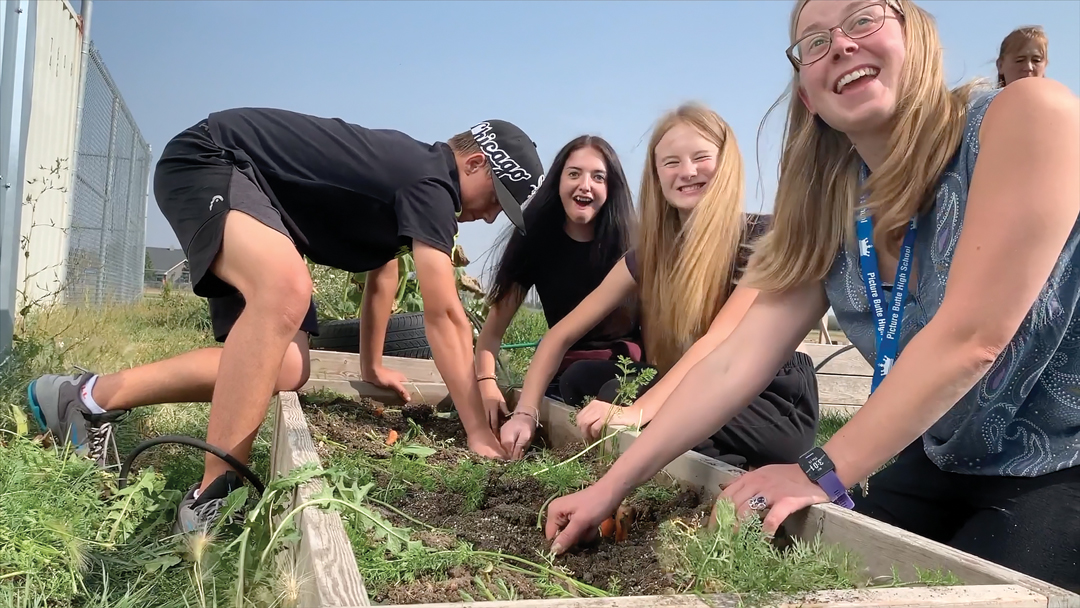FARM-BASED STUDIES ON THE RISE
BY IAN DOIG • PHOTO COURTESY OF RURAL DEVELOPMENT NETWORK
When Rayann Campmans signed up for the Picture Butte High School agricultural program, she and her fellow students knew they had to take an active role in directing and building the new initiative. They loved the idea of farm-based learning, but feared the program would be discontinued if it didn’t go over well. They pitched in to support the project.
Now a Grade 12 student, Campmans’s family operates a dairy farm near the town of Picture Butte. “I love my farm life,” she said. “I figured if I could help expose kids in our school who don’t have that experience, that would encourage students to come and enroll in our school. Especially because it’s a small town, and we lose a lot of kids to the big city.” The town is located just north of Lethbridge. As she and her schoolmates hoped, the farm program took off. From a school population of about 140, it drew 34 students in 2022, and this year, 56 signed up.
To help build its program, the school applied to take part in the creation of the FarmEd Toolkit, a farm-based learning guide. Developed by the Rural Development Network, it took inspiration from a very successful school farm project at Altario School located in north-central Alberta near the Saskatchewan border. The Altario program revitalized the school, which had teetered on the edge of closure, so Rural Development suspected its approach could work in additional rural communities.
Launched with a tulip garden project in 2016, the agricultural ambitions of Altario School bloomed to become the Altario Agricultural Academy in 2020. The school’s student-led farm is the hub of numerous learning activities. Adjacent to its playground, its farmyard facility houses livestock such as chickens, turkeys, geese, pigs, sheep and cow-calf pairs. With $300,000 in funds from sources that include the Prairie Land Public School Division, the school also recently added a modular, containerized hydroponic operation in which students grow leafy greens such as Swiss chard, herbs and lettuce.
While students in grades one through six act as farmhands, those in grades seven to 12 assume leadership positions, and their agrarian projects are tied to career studies. Morning chores are followed as needed throughout the day by tasks such as cleaning pens and fetching feed. Students are encouraged to think of farming as a river where its opposite banks respectively represent educational value and sustainability. The farm activities symbolized by the flow of water are defined by the students. “That’s how we got into the pig business,” said Kevin Van Lagen, the school’s principal and initiator of its farm program. “The students decided to trade four lambs for six pigs.” And, as on any farm, the students market their products and roll the profits back into the operation.
“We really thought there would be opportunity there for other rural schools to implement similar experiential learning initiatives with school farms,” said Lisa Belanger, Rural Development CEO.
Funded by the Sustainable Canadian Agricultural Partnership, Rural Development formed an advisory board and launched a pilot project to create the FarmEd Toolkit. It conducted a series of focus groups with students and staff at Altario and a handful of schools that had expressed interest in farm programming. An advisory committee representing agriculture and education organizations also participated. While Altario served as a model for the project, Picture Butte High School and Irvine School participated in 2022 as pilot project partners while they built their programs. Their work in turn shaped the final version of the Toolkit, and the document now serves as a guide for communities and schools to invent their own farm programs.
Jennifer Bowden, an off-campus teacher for the Palliser School Division, led the Picture Butte High School FarmEd pilot program effort, following a year-long bee club project in which she and the students set up several hives. The guidance and brainstorming assistance the school received during the pilot project were very constructive, she said. Through the school’s current farm programming, students can receive Alberta Education credits as well as Green Certificate credits through Lethbridge College. Picture Butte principal Mark Lowe manages the program while Brian Bergsma is its lead teacher.
A successful application for a Farm to Cafeteria Canada grant of $10,000, plus $6,500 from the Lethbridge Community Foundation and school board funding further boosted the program. A total of $65,000 in grants has covered most startup costs. The school’s FarmEd program now includes an aquaponic system to raise fish, a hydroponics system and a greenhouse. In the warm months, two coops house 15 laying hens. “Our present program includes an ag business wing run by our students,” said Lowe. “We try to be innovative with things like creating a partnership with local restaurants to supply their lettuce needs and help other schools start up FarmEd programs.”
“For us, the main motivation is less about teaching agricultural skills, and more about giving kids something hands-on and engaging to be excited about,” said Bowden. The students have responded enthusiastically. “There’s an element of connection and bonding. This kind of camaraderie is difficult to replicate.”
Farm students develop a wide variety of applied skills. They have learned to weld and build fences, and they’ve constructed and shingled chicken coops. The program has also formed new learning opportunities across the curriculum. The school’s mechanic students repaired and maintained the farm’s temperamental rototiller and art students designed a farm logo.
“The program is a great opportunity to expand your learning about the whole agriculture system—where food comes from and how it’s grown and produced,” said Campmans. “The FarmEd program opened my eyes. It helped me find what I really like is advocacy for agriculture.” She has been accepted into the Olds College Agricultural Management program to major in agricultural production. Her education plan also includes attending university for an applied science degree and earning a communications certificate.
The online FarmEd Toolkit is available to schools free of charge. As well as laying out methods of governance, it provides guidance on how to build engagement with community, school boards and teachers. To finance facilities, infrastructure and the purchase of animals and supplies, it also tackles community fundraising, institutional grants and sponsorship. Belanger stressed the process to create a farm program is unique to each school. She encourages schools to contact Rural Development for assistance with tasks such as preparation of funding applications. Schools with existing programs can also provide guidance.
Van Lagen recommended each school take an approach that fits its unique goals and generate support from students and the community. “What the pilot schools and the Altario School really emphasize is the success of the program really depended on getting student buy-in and making sure the students and the staff were really involved in its design.”
In the hands of a motivated team, with the leadership of “project champions” such as staff and community members, the Toolkit is “an awesome blueprint,” said Van Lagen. Like Belanger, he emphasized the Toolkit is not a step-by-step guide. “It’s really a product to help you customize your own program. Use it to complement your vision.
“The agriculture industry is extremely supportive, and they put their money where their mouth is,” he added. “They love that students get involved in agriculture at a younger age. It’s their future workforce, and the future of agriculture. Many farms don’t necessarily have a succession plan in place. We’re building solutions for that.”
For more information, visit ruraldevelopment.ca/resources.







Comments